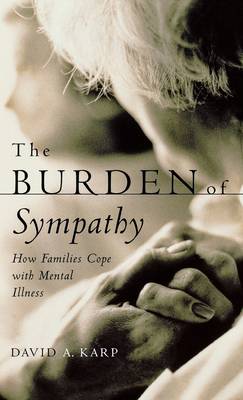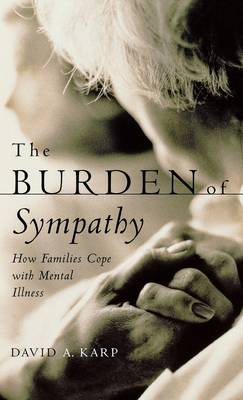
Je cadeautjes zeker op tijd in huis hebben voor de feestdagen? Kom langs in onze winkels en vind het perfecte geschenk!
- Afhalen na 1 uur in een winkel met voorraad
- Gratis thuislevering in België vanaf € 30
- Ruim aanbod met 7 miljoen producten
Je cadeautjes zeker op tijd in huis hebben voor de feestdagen? Kom langs in onze winkels en vind het perfecte geschenk!
- Afhalen na 1 uur in een winkel met voorraad
- Gratis thuislevering in België vanaf € 30
- Ruim aanbod met 7 miljoen producten
Zoeken
€ 169,45
+ 338 punten
Uitvoering
Omschrijving
What are the limits of sympathy in dealing with another person's troubles? Where do we draw the line between caring for a loved one, and being swallowed up emotionally by the obligation to do so? Quite simply, what do we owe each other? In this vivid and thoughtful study, David Karp chronicles the experiences of the family members of the mentally ill, and how they draw "boundaries of sympathy" to avoid being engulfed by the day-to-day suffering of a loved one.
Working from sixty extensive interviews, the author reveals striking similarities in the experiences of caregivers: the feelings of shame, fear, guilt and powerlessness in the face of a socially stigmatized illness; the frustration of navigating the complex network of bureaucracies that govern the mental health system; and most of all, the difficulty negotiating an "appropriate" level of involvement with the mentally ill loved one while maintaining enough distance for personal health. Throughout the narratives, Karp sensitively explores the overarching question of how people strike an equilibrium between reason and emotion, between head and heart, when caring for a catastrophically ill person. The Burden of Sympathy concludes with a critical look at what it means to be a moral and caring person at the turn of the century in America, when powerful cultural messages spell out two contradictory imperatives: pursue personal fulfillment at any cost and care for the family at any cost.
An insightful, deeply caring look at mental illness and at the larger picture of contemporary values, The Burden of Sympathy is required reading for caregivers of all kinds, and for anyone seeking broader understanding of human responsibility in the postmodern world.
Working from sixty extensive interviews, the author reveals striking similarities in the experiences of caregivers: the feelings of shame, fear, guilt and powerlessness in the face of a socially stigmatized illness; the frustration of navigating the complex network of bureaucracies that govern the mental health system; and most of all, the difficulty negotiating an "appropriate" level of involvement with the mentally ill loved one while maintaining enough distance for personal health. Throughout the narratives, Karp sensitively explores the overarching question of how people strike an equilibrium between reason and emotion, between head and heart, when caring for a catastrophically ill person. The Burden of Sympathy concludes with a critical look at what it means to be a moral and caring person at the turn of the century in America, when powerful cultural messages spell out two contradictory imperatives: pursue personal fulfillment at any cost and care for the family at any cost.
An insightful, deeply caring look at mental illness and at the larger picture of contemporary values, The Burden of Sympathy is required reading for caregivers of all kinds, and for anyone seeking broader understanding of human responsibility in the postmodern world.
Specificaties
Betrokkenen
- Auteur(s):
- Uitgeverij:
Inhoud
- Aantal bladzijden:
- 348
- Taal:
- Engels
Eigenschappen
- Productcode (EAN):
- 9780195123159
- Verschijningsdatum:
- 12/10/2000
- Uitvoering:
- Hardcover
- Formaat:
- Genaaid
- Afmetingen:
- 146 mm x 217 mm
- Gewicht:
- 498 g

Alleen bij Standaard Boekhandel
+ 338 punten op je klantenkaart van Standaard Boekhandel
Beoordelingen
We publiceren alleen reviews die voldoen aan de voorwaarden voor reviews. Bekijk onze voorwaarden voor reviews.









